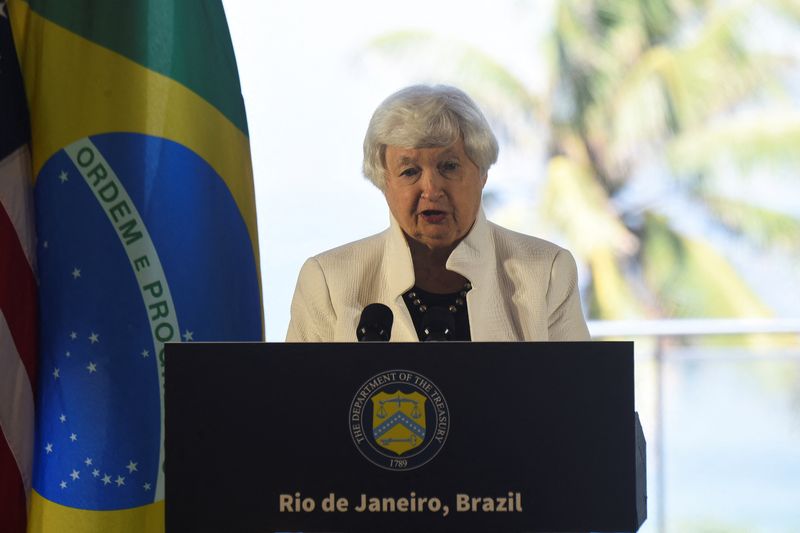By David Lawder
RIO DE JANEIRO (Reuters) -U.S. Treasury Secretary Janet Yellen said on Friday that she opposes shifting global tax deal negotiations away from the Organisation for Economic Cooperation and Development to the United Nations, pushing back against the desires of some developing countries and non-profit groups.
Yellen told Reuters on the sidelines of a Group of 20 finance leaders' meeting in Brazil that she believes the OECD, which has shepherded negotiations over a two-part corporate tax deal for the past three years, is better placed to handle such talks.
"We don't want to see this shifted to the UN," Yellen said in Rio de Janeiro. The OECD "is a consensus-based organization. We've made a huge amount of progress, and the UN doesn't have the technical expertise to do this."
Moving negotiations to the UN would bring many more countries into the process and its majority vote structure is not suited to complex tax negotiations where countries need to all agree on terms that support their interests, Yellen said.
"Countries have to come to the table and agree to do it. The United States is just not going to do something because it was a majority vote in the UN," she added.
Brazil, which holds the G20 presidency, had initially sought to add a third "pillar" to the global tax deal agreed by some 140 countries in the form of a common levy on ultra-wealthy individuals, alongside Pillar 1, a reallocation of taxing rights on large, multinational corporations, and Pillar 2, a 15% corporate minimum tax.
The effort morphed into a declaration by G20 countries to work together to ensure that the ultra-rich are effectively taxed, in a move that seeks a balance between national sovereignty and more cooperation on tax avoidance.
As part of this process, Brazil had sought to advance the tax debate at both the OECD and the UN, a source familiar with the effort said.
Non-profit group Oxfam had called on G20 countries to align the OECD tax talks with the UN, saying "a truly democratic process" was needed to set standards on taxing the ultra-rich.
"Entrusting this task to the OECD — the club of mostly rich countries — would simply not be good enough," Oxfam said in a statement.
Yellen said there may be some tax topics that would be appropriate for the UN, "but not this."
PILLAR 1 TALKS
Yellen also said that there has been good progress in talks on the 'Pillar 1' tax agreement, but India, China and Australia remain holdouts on U.S. demands over alternative ways to calculate transfer pricing, known as "Amount B."
The U.S. continues to insist on the method, which would cover companies not included in the largely completed Multilateral Convention for calculating local tax liabilities for the largest companies with annual revenues above $20 billion.
Amount B would provide an objective way for smaller firms to calculate transfer pricing and hence tax liabilities, reducing the incidence of costly tax disputes for multinationals for the most common types of activities.

"And so that is a red line for us in that we need a mandatory Amount B," Yellen said, adding that work would continue to bring countries on board.
She said that India was "a stumbling block," but added that "China I don't think is dug in against participating. It would not surprise me if we can get China to sign on to this and to participate."